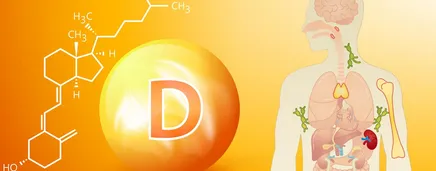

When it comes to providing optimal support for the brain, particularly following a brain injury or stroke, vitamin D and omega-3 fatty acids (fish oil) are at the top of the must-have list.
Vitamin D certainly offers a tremendous range of benefits for the brain and body, as it is involved in many different systems and functions. Here we will detail a few benefits that are particularly relevant to brain injury recovery.
In recent years, low vitamin D levels have been strongly associated with depression and poor overall mood, as well as emotional dysregulation. Introducing vitamin D to depression patients has been clinically shown to improve their mood as effectively as antidepressants.
Vitamin D deficiency is also linked to poor cognitive function, particularly in people over 50. Vitamin D exhibits neuroprotective qualities, meaning that it promotes the health of the brain through its ability to clear out free radicals and amyloid beta, which over time accumulate in the brain and lead to Alzheimer’s, dementia, and chronic traumatic encephalopathy (CTE) for those with repeated head injuries.
Research also shows that low vitamin D levels increase one’s risk for a stroke, as well as the severity of stroke. Thankfully, research is demonstrating that stroke survivors who take vitamin D show improved recovery outcomes.
Vitamin D contributes greatly to bone strength and bone health in general, as well as reducing fall risks by strengthening muscle contractions. This is very important for stroke and TBI patients rehabilitating motor function. It also plays a major role in immune system function, protecting against respiratory infections and viruses through its role in signaling T-cells (killer cells) that seek out and eliminate pathogens in the body.

AN EPIDEMIC OF VITAMIN D DEFICIENCY
Recent studies found that over 42% of the world’s population is deficient in vitamin D, with that number doubling to about 80% for the BIPOC population. These numbers are staggering, especially when one understands how absolutely vital vitamin D is for a healthy brain and immune system.
WHY ARE SO MANY PEOPLE DEFICIENT IN VITAMIN D?
The simple answer points to lifestyle and work conditions. We are spending more time indoors instead of working outside like our ancestors, and we are eating foods that are nutrient-depleted, as well as not eating a healthy balance of foods.
Vitamin D is found in salmon, sardines, and egg yolks, to name a few, and can also be synthesized by our skin through sunlight exposure. Since it is only found in a few foods and most people don’t get the recommended amount of time in the sun every day, it can often be beneficial to consume vitamin D in supplement form.
While it is true that vitamin D can be synthesized from sunlight, certain populations and ethnicities convert sunlight into vitamin D more efficiently than others. Those with darker skin tend to synthesize less vitamin D from the sun, while causasians with fair skin tend to be more efficient in vitamin D conversion. We recommend spending time in the sun every day for a range of benefits, including vitamin D intake, circadian rhythm refinement (morning/evening), mood, and more.
OMEGA-3 FATTY ACIDS / FISH OIL BENEFITS
Fish oil is a highly recommended supplement for our many patients, and it primarily contains two types of omega-3 fatty acids — eicosapentaenoic acid (EPA) and docosahexaenoic acid (DHA), which are well known for their benefits for the brain, heart, liver, skin, and more.

OMEGA-3s HELP RECOVERING BRAINS
These two fatty acids, EPA and DHA, have powerful anti-inflammatory qualities which significantly help reduce inflammation in the brain after a stroke, TBI, or concussion, as well as helping to keep the cardiovascular system functioning smoothly.
In addition to reducing inflammation, omega-3s also play a major role in the health and function of neurons, or brain cells, as they help strengthen the cell membranes and improve communication between neurons. Therefore, omega-3s are extremely important for neurological rehabilitation after an injury, as well as for those suffering from psychiatric disorders such as depression and PTSD.
Similarly to vitamin D, the research is showing that omega-3s can help the brain significantly as it ages, helping to preserve memory, learning, and cognitive function and reducing the risk of developing Alzheimer’s or other neurodegenerative disease.
WHERE DO OMEGA-3s IN FISH OIL COME FROM?
Fish get EPA and DHA from eating ocean plankton and algae, which led to the common belief that wild caught fish had more omega-3s than farm fed fish (which are often raised on corn). However, recent studies show that the omega-3 content of farm-raised and wild fish is roughly equivalent because fish oil is added to many farmed fish diets and farmed fish are generally fattier than wild fish.
Since many Americans do not eat the recommended amount of fish, it can be helpful to take a fish oil supplement containing these two omega-3 fatty acids, EPA and DHA. We will help you choose a fish oil supplement of the highest quality, as not all supplements are made equally.
To become a patient at Resiliency, please fill out this contact form.
Research: